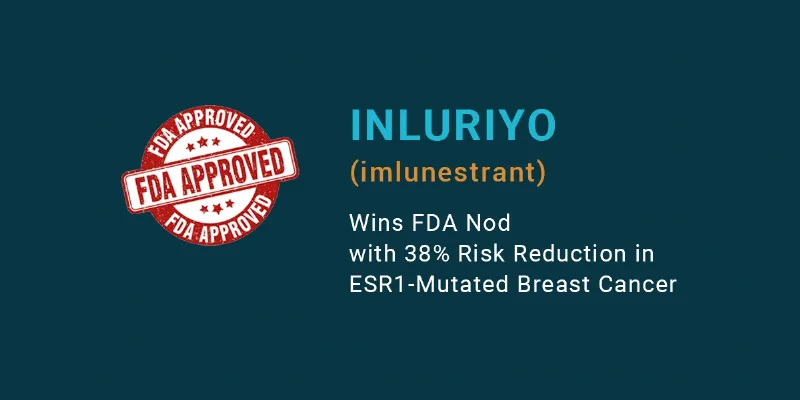FDA Approves Imlunestrant for ESR1-Mutated Metastatic Breast Cancer

27 September 2025
The FDA has approved imlunestrant (Inluriyo), the first oral estrogen receptor antagonist for ER+, HER2–, ESR1-mutated metastatic breast cancer. In the Phase 3 EMBER-3 trial, Inluriyo reduced the risk of progression or death by 38% versus endocrine therapy, achieving a median progression-free survival of 5.5 months compared with 3.8 months for standard treatments.
Eli Lilly and Company announced that the U.S. Food and Drug Administration (FDA) has approved imlunestrant (Inluriyo), an oral estrogen receptor antagonist, for adults with estrogen receptor-positive (ER+), HER2-negative, ESR1-mutated advanced or metastatic breast cancer. The approval covers patients whose disease has progressed after at least one line of endocrine therapy.
FDA also approved the Guardant360 CDx assay as a companion diagnostic device to identify patients with breast cancer with ESR1 mutations for treatment with imlunestrant.
"This represents an important advancement for patients with ESR1-mutated MBC, a mutation found in nearly half of patients who have taken hormone therapies, often contributing to treatment resistance," said Dr. Komal Jhaveri, section head of Endocrine Therapy Research at Memorial Sloan Kettering Cancer Center and principal investigator of EMBER-3. “With its demonstrated efficacy, tolerability profile and oral administration, this therapy provides a meaningful alternative treatment option for this patient population.”
Key Trial Results
The EMBER-3 trial enrolled 874 patients with ER+, HER2– advanced or metastatic breast cancer. Among the 256 patients harboring ESR1 mutations, imlunestrant monotherapy achieved a median progression-free survival (PFS) of 5.5 months compared with 3.8 months for fulvestrant or exemestane (HR=0.62; 95% CI: 0.46–0.82; p=0.0008).
Treatment benefits were observed across both first-line and second-line metastatic settings, with 21% of participants having prior exposure to CDK4/6 inhibitors.
Safety and Tolerabilit
Adverse events were generally low grade. The most common treatment-related effects (≥10%) included decreases in hemoglobin, calcium, neutrophils, and platelets, along with musculoskeletal pain, fatigue, diarrhea, nausea, and mild liver enzyme elevations. Treatment discontinuation occurred in 4.6% of patients, while 2.4% required dose reductions and 10% required interruptions.
Clinical Rationale
Approximately half of patients with ER+, HER2– metastatic breast cancer will acquire an ESR1 mutation during or after aromatase inhibitor treatment. These mutations cause estrogen receptors to remain overactive, fueling tumor growth and contributing to resistance against traditional endocrine therapies. Inluriyo directly binds, blocks, and facilitates degradation of estrogen receptors, offering a targeted oral option for this challenging subset of patients.
Expanding the Treatment Landscape
The FDA approval introduces a new oral alternative to injectable therapies for patients with ESR1-mutated MBC. Patient advocacy groups emphasized the importance of this milestone.
Inluriyo is also under investigation in the Phase 3 EMBER-4 trial, which is evaluating its role as an adjuvant treatment in ER+, HER2– early breast cancer at high risk of recurrence. The study aims to enroll approximately 8,000 patients worldwide. Eli Lilly has confirmed that Inluriyo will be available in the United States within the coming weeks.











Comments
No Comments Yet!